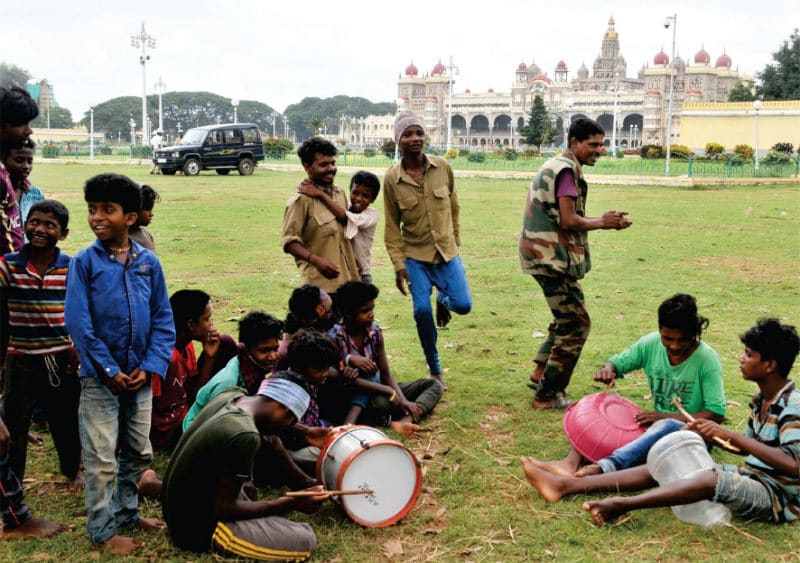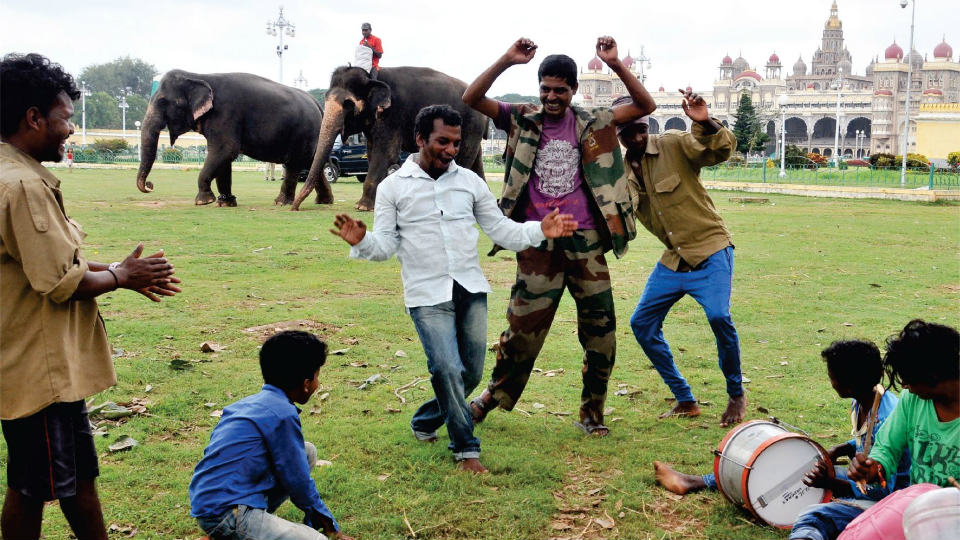Mysuru: For the first time, children of Mahouts and Kavadis of Dasara elephants will stage the play ‘Kindarijogi’ at the Makkala Dasara. In that context, children are busy practicing the play at the Tent School at Palace premises. The play is based on ‘Bommanahalliya Kindarijogi’ written by Rashtrakavi Kuvempu.
Mahouts and Kavadis stay in the city for a month-and-a-half for Dasara. To enable their children have continuity in education, a Tent School is usually established at Palace premises. With the elephants, over 22 children of Mahouts and Kavadis have also arrived from various jungle camps and they are camping at the Mysore Palace.
Usually, children of Mahouts and Kavadis present a song and dance programme at ‘Makkala Dasara.’ But for the first time this year, a play will be enacted at Jaganmohan Palace here on Sept.22 or 23 to bring out the hidden talent of those children.
For the first time the Education Department has deputed two teachers to the Tent School to teach music and drama to children to create an aptitude for art among them. Accordingly Drama teachers Rangaswamy and D. Nagendra Kumar of Kuvempu High School and Music teacher M.V. Anitha of Kuvempunagar Government High School have been deputed to the Tent School to groom the children.

Speaking to Star of Mysore, DDPI B.K.S. Vardhan contended that tribal children living in the forest usually lack concentration and hence opined that the children prefer to learn music and dance instead of basic education. He further said that the interest of those kids in extra-curricular activists needs to be nurtured to evolve an artiste in them.
Continuing, Nagendra Kumar said that the play ‘Kindarijogi’ has an excellent moral for kids exposing the concepts of gratitude and betrayal.
About the play
‘Bommanahalliya Kindarijogi’ by Kuvempu is a classic poetic work. Inspired by Robert Browning’s ‘Pied Piper of Hamlin’, Kuvempu wrote this fairy tale-like poem 70 years ago. The moral and the message, the poet wanted to convey then are still fresh and even more relevant to the present day world where breaking promises has almost become the order of the day.
Along with emphasising on keeping promises, Kuvempu harps on two predominant features of humans namely Deva (godly) and Danava (demonly) behaviours and ultimately portrays that man, shunning his demonly behaviour must try to attain godliness.
Bommanahalli Gouda’s atrocities are worse than the havoc caused by rats for the villagers. Their repeated appeals to him and attempts to curb the rat menace fail miserably. At this juncture arrives Kindari Jogi, whose kindari (musical instrument) mesmerises the rats, which follow him to the tank where all of them drown. In the meantime, he puts off fulfilling his promise to Jogi, which irritates him. He lures the kids with his musical instrument and takes them away from the village with a warning to mend their ways or realise how costly it will be when promises are not met.








Recent Comments